Afghanistan Archive
Free Newsletter
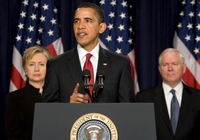
President Barack Obama’s speech Wednesday evening announcing America’s policy toward Afghanistan in the coming year is another manifestation of his “Just Enough” doctrine, by which he takes “only those steps that are likely to produce a satisfactory outcome, rather than guaranteeing an optimal one.” It helps, of course, that Obama’s December 2009 West Point speech announcing the Afghanistan surge did not set very strict criteria for U.S. success. In his remarks two days ago, he reiterated those benchmarks: a U.S. effort designed “to refocus on al-Qaida; reverse the Taliban’s momentum; and train Afghan Security Forces to defend their own country.” […]
In thinking about the trajectory of President Barack Obama’s approach to the Afghanistan War, from the initial March 2009 strategy review to the December 2009 troop surge to last night’s address, it occurred to me that, when it comes to the politics of the war, Afghanistan has gone from being the “Good War” to being what is now the “Subprime War.” The administration’s initial March 2009 review was the equivalent of a “nothing down” mortgage. As I noted at the time, it threaded a political needle, articulating a strategy — a counterinsurgency approach to counterterrorism — that allowed everyone to […]
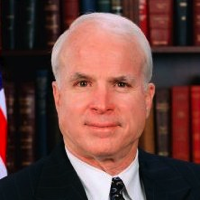
Sen. John McCain is worried about the direction of U.S. foreign policy, especially within his own party. Some Republican presidential contenders have questioned the nation-building mission in Afghanistan. Others point out that the undeclared war in Libya is neither necessary nor constitutional. “This is isolationism,” an aghast McCain declared on the ABC News program “This Week.” Isolationism? The term “isolationist” is little more than a slur. It essentially means someone who thinks the U.S. should engage in fewer foreign wars than the speaker does. The term emerged in the late-19th century, when it was made popular by the ardent militarist […]

The Obama administration appears to be in the throes of yet another debate about the long-term U.S. commitment to Afghanistan. Inside the administration, officials are weighing not only the material costs of remaining in Afghanistan, but also the political and bureaucratic implications of continuing the war. Undoubtedly, some are asking the question, “What would a withdrawal from Afghanistan say about the United States?” Some might answer that a withdrawal would embolden America’s enemies and indicate that the United States is both weak and unwilling to stand behind its friends. The late, esteemed George Kennan suggested another interpretation of such a […]
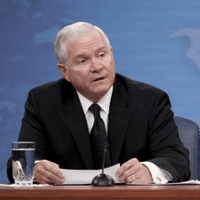
On June 10, Robert Gates ended his last major policy speech in Europe as defense secretary with his most public rebuke ever regarding Europeans’ failure to provide adequate defense resources to the trans-Atlantic alliance. Gates complained that NATO had finally become what he had long feared: a “two-tiered alliance” divided between those few allies that engage in “hard” combat missions on one hand, and the overwhelming majority of members that can only contribute extensively to “soft” noncombat operations like humanitarian, peacekeeping and training missions on the other. Gates correctly noted that proposed NATO-wide reforms and efficiency measures would at best […]

Although the United States has been using private contractors in one way or another since the founding of the country, it is the experience of the past decade, since the Sept. 11 terrorist attacks, that has focused attention on private military and security contractors (PMSCs) to unprecedented levels. The U.S. Defense Department and State Department, as well as other U.S. agencies and other countries, have used contractors in Iraq and Afghanistan both for logistics work, which accounts for the vast majority of contractors, as well as for much more publicized, but numerically far smaller, security roles. As a result, even […]

In the early 1960s, the attempted secession of Katanga, a province in the southern part of today’s Democratic Republic of the Congo in Central Africa, dominated the headlines. The fighting there was perhaps the first expression of a new form of conflict, as it was not a conventional war between states or an independence movement pitting local insurgents against colonial powers, but rather an internal conflict featuring a multitude of nonstate actors. Foreign soldiers and military advisers seconded by Belgium as well as a stream of European mercenaries descended into Katanga. A multinational peacekeeping force deployed to Katanga under a […]
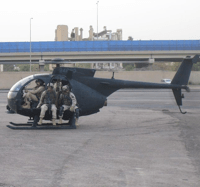
It has been nearly two decades since the international community first focused significant attention on the private military firm as an important actor in conflict. Although quasi-firms and groups of individuals had operated in conflict zones before, a series of high-profile interventions by private military firms in the 1990s served as a watershed moment for the private security industry. In particular, the positive changes to the security environment brought about by private military firms in Angola (1992-1995), Sierra Leone (1995-1999) and Croatia (1994-1996), combined with newfound claims for the firms’ legitimacy as security actors, made the world sit up and […]
U.S. Defense Secretary Robert Gates’ visit to Afghanistan this week prompted contradictory reports about both the war’s progress and the likelihood for an accelerated troop withdrawal. Some observers said President Barack Obama’s security team was now considering the option of a swift pullout. Others quoted Gates as saying it’s too early to end combat. Meanwhile, a U.S. general touted success in training Afghan forces just as Congress released a report criticizing the Afghan nation-building program. Joshua Foust, a fellow and Afghanistan specialist with the American Security Project, tells Trend Lines that the conflicting reports are best explained by a widening […]
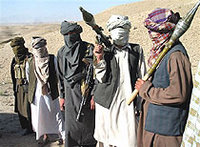
In recent weeks Taliban fighters have been handing over their weapons in record numbers in Afghanistan. This spike in the defection rate, perhaps motivated by Osama bin Laden’s death, has opened an important window of opportunity for U.S. and NATO forces fighting there. But so far the West has not been able to capitalize on this surge in Taliban defections effectively. In fact, in some cases, those interested in abandoning the insurgency and joining the government’s side are even being turned away. The failure to prioritize and generously fund defection and reintegration programs in Afghanistan poses a threat to the […]
